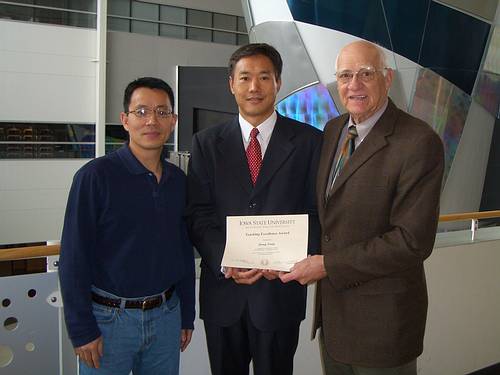On May 16, Iowa State alumnus and supporter Murray Harpole died suddenly at the age of 89.
Those who knew Harpole remember him as a devoted friend and family member, creative engineer, successful businessman, and generous philanthropist. He made his home in Minnesota, but the many years he spent bettering Iowa State and its engineering education made it hard to believe he ever left campus.
As a 1943 graduate of electrical engineering, Harpole understood the importance of student resources and exceptional faculty. He was a life member of the Iowa State Alumni Association and served on the board of directors of the Iowa State Foundation, Iowa State Research Park, and the Electrical Engineering Advisory Committee.
In addition to his gift of time, Harpole was a respected benefactor. He and his wife Ruth sponsored scholarships, two teaching fellowships in electrical and computer engineering, and contributed to the Engineering Teaching and Research Complex, as well as renovations to Coover Hall. Dan Saftig, president of the Iowa State University Foundation, spoke at Harpole’s funeral and recalled the gracious way he and Ruth contributed to Iowa State: “Their generosity was to be quiet and understated, he made that clear to us.”
Harpole’s professional success made his charitable giving to Iowa State possible. His work experience was vast and began with nuclear weapons development after college. He devoted the next 20 years to four different companies working on a variety of projects. Then at the age of 45, Harpole and four others founded Pentair, Inc. Although their original idea of engineering and manufacturing high-altitude research balloons was not viable, Pentair found success purchasing and developing other businesses and as a water solutions and technical product company. Harpole even dipped his toe into writing when he penned a book about the creation of Pentair entitled: Living the American Dream: Pentair, Inc.—The First Twenty-five Years.
It is a book Harpole’s friend and College of Engineering Dean Jonathan Wickert treasures. Wickert pulls the book off a shelf in his office and talks of his long-standing interest in Harpole’s background, leadership, and entrepreneurial experience.
“We could talk for hours and cover all kinds of topics, which was something I greatly enjoyed,” says Wickert. “His advice and experience helped the electrical engineering program create a strong curriculum, and his involvement reflects the value he placed on education.”
Wickert pauses during his reflection, searching for the right words to summarize Harpole. He shakes his head and a smile slowly spreads across his face as he says, “He was just a really nice guy.”
There is one Iowa State undergraduate who knew Harpole well and agrees with that statement wholeheartedly—his granddaughter Lauren Jessen, a senior double majoring in event management and hospitality management. As a high school junior and Minnesota native, she had never considered attending Iowa State, but after a visit with her grandparents to “just look,” she decided it was the place for her. Harpole showed his approval by giving her his freshman student handbook from 1940.

“Looking back at pictures from my childhood I do see a number of Cyclone sweatshirts, so perhaps there was a little grandparent subliminal messaging,” she jokes. “Honestly though, I know he would have been supportive of whatever college I chose to attend. I, on the other hand, have enjoyed going to his alma mater, because I got to see him and my grandma in a place that meant so much to him.”
The Harpoles were proud grandparents, attending football games to watch Jessen when she was in the marching band. She says her grandfather always wanted to hear about her classes and life in Ames.
“We both worked for Iowa State Dining, so it was fun to talk about a common bond we both shared while at college,” she says. “He would often talk about how different the university was since he attended, but I think his Cyclone pride had only grown over the years.”
Although he especially loved sharing Iowa State traditions with Jessen, he didn’t wait until college to get involved with her academics and share his engineering knowledge.
“He loved to work through projects and challenge others to learn as well,” she says. “He used his degree not only to start a company but also to solve everyday problems. He was an engineer through and through and was the person to go to if you needed help with a science project or needed something repaired.”
Education wasn’t the only thing Harpole passed on to his granddaughter through example. “I am constantly humbled when I think about my grandfather and how he made volunteering a key part of his life,” says Jessen. A powerful example for her was his relationship with Fama Lo. Lo met Harpole while on an exchange trip from Senegal when she spoke at his rotary club meeting. When the Harpoles learned of her interest in attending a university in the United States, they helped her in every way they could. Lo graduated from Iowa State in 2004 with a degree in computer engineering and Spanish.
“Fama is doing amazing things with her life and has inspired our family and become a sort of adopted cousin,” says Jessen. “I think she is a testament to how important it is not to just donate, but to invest yourself, and that is what my grandpa always did.”
The investments he made in Iowa State will not be forgotten and may be best summarized by Saftig’s last words at Harpole’s funeral: “Iowa State is honored to be linked forever to one of its graduates who embodied Iowa State’s own values of honor, integrity, and passion for education. He was the definition of a gentleman and had a profound impact on the lives of many. His legacy will be forever.”
